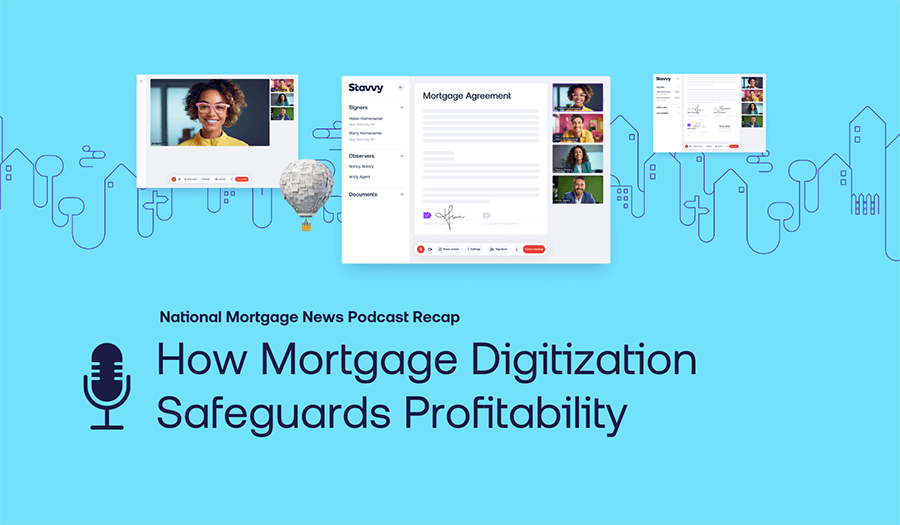Coordinating real estate closings isn't always easy. Buyers and sellers often have complex transactions and scheduling needs, requiring mail-away closings, a mobile notary, or power of attorney – all of which can add extra expense and extend timelines.
The pandemic gave home buyers and sellers a preview of what’s possible in terms of digital real estate transactions. Many completed digital closings and aren’t eager to rewind the clock. This is further supported by ALTA’s Digital Closing Survey, which reported that 65% of customers have a positive perception of RON closings.
With customer expectations changing and many states making temporary RON legislation permanent, you might wonder if your business should offer eClosing with remote online notarization (RON). It’s a great question, and you may be pleasantly surprised to learn that many title companies are going digital.
But first things first. What is RON software, and how does it help title companies?
What is RON software?
RON software is technology that allows buyers and sellers to sign closing documents without needing to be in the same location as a notary. It can help title companies and real estate attorney firms become more operationally efficient and competitive while offering benefits, including faster transaction times and improved security. Stavvy's eClosing solution, for example, includes RON software.
Unsure if RON is permissible in your service area?
We’ve compiled a list of states that allow remote online notarization as a quick reference. However, keep in mind that state laws can change frequently. Therefore, if you have questions about local RON laws, we recommend that you consult with your attorney and refer to your local Secretary of State (SOS) website for a list of compliant RON vendors. Stavvy customers can gain further legislative insight by leveraging our Eligibility Engine, which is part of our eClosing solution. The Eligibility Engine instantly determines a real estate transaction’s RON acceptability based on the property address.
What should you look for in a RON solution?
As you begin your journey to find the best RON platform, it can be overwhelming to narrow your options. What functionality should a tool include? How do you know that it’s secure and compliant? And how can you be certain that it’s providing the best possible experience for your notaries, customers, and real estate partners? Look for RON software that:
- Allows unlimited meeting attendees. Real estate transactions are complex, and buyers and sellers often have questions on closing day. A RON solution that accommodates multiple participants allows signers to invite additional parties, such as real estate agents, loan officers, and family, to answer questions in real time or provide support. Stavvy, for example, allows unlimited participants to be added to any remote notary session.
- Has identity verification and fraud prevention. A RON solution should be easy to use and carry that simplicity into a highly secure and compliant remote meeting experience. Stavvy uses knowledge-based authentication (KBA), credential analysis, and multi-factor authentication (MFA) to verify the identity of signers. If you’re new to the KBA process, signers are asked to answer a series of personal questions based on credit reports and public records. KBA does not initiate a hard credit pull, so there is no impact on a signer’s credit score.
- Uses audio-visual communication. Ensure the RON provider offers a stable audio and video connection where all meeting participants can see and hear each other clearly.
- Supports improved compliance. RON solutions should also help you stay compliant through features such as digital certificates. Closing documents should be protected with tamper seals and include a digital audit trail. Stavvy allows for this; plus, you can recall RON sessions with video recordings for 10 years.
- Is MISMOⓇ certified and SOC 2 compliant. A MISMO RON certification helps ensure a platform complies with MISMO standards and best practices. The RON solution should also maintain a SOC 2 audit report to demonstrate its commitment to protecting the confidentiality, integrity, and availability of customer data.
- Provides on-demand customer support. Make sure that a tool is easy to use but also that if your team gets stuck, on-demand customer support is available to troubleshoot. Celebration Title Group uses Stavvy's eClosing solution, and Tristan Ali mentioned the difference that getting quick help makes for him and his fellow closing specialists. “Unlike our previous notarization and eSignature providers, Stavvy has immediate support services available to its customers,” Ali says. “In the past [with other providers], we’d report an issue to a generic support hotline and wait three or four days for a response. This isn’t particularly favorable for time-sensitive real estate closings.”
How does a real estate closing work with RON?
A RON closing mirrors a traditional closing workflow but is often faster since much of the work is handled electronically and online. For example, the RON feature on the Stavvy platform is simple and includes the following steps:
- Verify that a closing is RON eligible. Title agents are busy and don’t have time for extra steps, additional tasks, or lengthy processes. Stavvy has a built-in, proprietary Eligibility Engine that allows closing staff to instantly determine if a transaction is RON-eligible via the platform or API.
- Establish a meeting and invite signers. The title agent invites all relevant parties to a RON signing via automated email notifications. If there are additional parties to invite, such as real estate agents or mortgage loan officers, users are free to invite them, too, with no cap on meeting attendees.
- Prepare documents for electronic signature. With the meeting set and relevant parties invited, the title agency can prepare digital closing documents. Stavvy makes this process faster with annotation templates and a simple tagging workflow.
- Verify signers and begin the closing. The notary uses the Stavvy platform to securely and accurately verify the identities of all signers before the meeting.
- Monitor and execute the signing process. A notary facilitates and monitors the signing process virtually.
A RON closing process can be faster than traditional closings and provides increased flexibility to signers. For example, a Stavvy customer significantly reduced closing times and reduced last-minute POA requests by switching to digital closing.
“We’re cutting closing times in half,” shares The Title Team. “It also helps eliminate power of attorney (POA) requests because people generally have an easier time attending a remote closing. Eliminating the POA alone saves a signer $92 in Minnesota by simply not having to record an additional document.”
Why an all-in-one eClosing solution is a great option for title companies interested in RON
With an all-in-one eClosing solution, you don’t have to choose between offering RON, IPEN, or other digital closing options. Instead, you can offer them all from one platform without investing in individual tools. If your real estate partners aren’t ready for a full eClosing with RON, you can meet them where they are with alternatives such as a hybrid closing, IPEN, eNote, or eSign. Regardless of the option selected, you can help speed up closings, lower costs, and provide an improved experience for customers and partners by going digital.
“I’ve had signers and real estate agents who have performed an eClosing with RON in Stavvy for the first time and ask me when they can do it again because it was so easy and convenient,” says Morgan Foley, Business Development Specialist at Broker’s Title.
Learn more about how the Stavvy Platform is taking real estate beyond documents.



![[Webinar Recap] Advancing Your Digital Default Servicing Strategy](https://blog.stavvy.com/hubfs/advancing-your-digital-default-servicing-strategy-blog-recap.png)